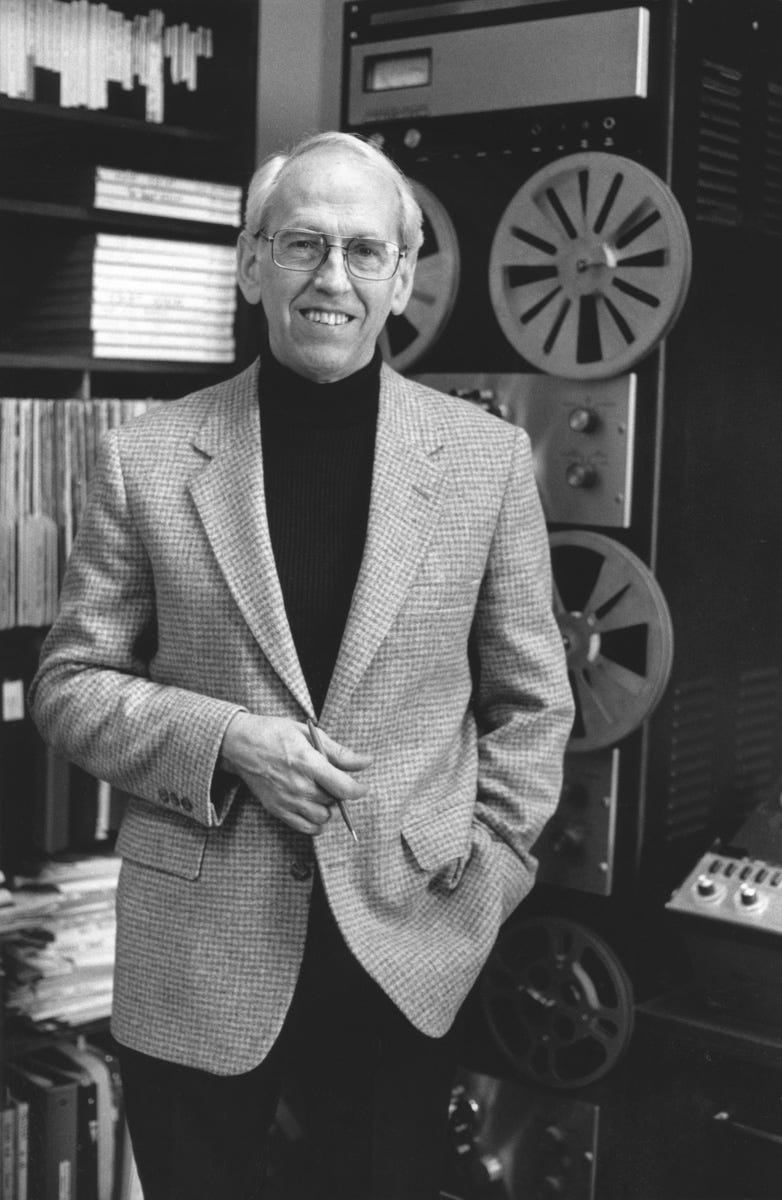(Paying Subscribers, there’s more music from the 1971 Eastman concert for you at the bottom, with my sincere thanks.)
Last time I gave you some background about my undergraduate years at the University of Rochester, 1968-1972, and my semester in a jazz combo directed by trumpeter-flugelhornist and composer Chuck Mangione. I shared with you my college newspaper review of a concert by the Eastman Jazz Ensemble, directed by Mangione. Here’s what happened next:
The morning after the review came out, I saw a saxophonist friend, one of my few jazz musician colleagues based on the main “river campus” rather than at Eastman. He saw me, came over in a hurry, and said, “I have a message for you from Professor Wright.” Rayburn “Ray” Wright was the highly respected jazz arranging teacher at Eastman (1970-90), and chair of the newly founded Jazz and Contemporary Media department. (On the web, his name is often misspelled Raeburn.) My friend continued, to the best of my memory:
I’m taking an evening class with Wright on how to write music reviews and articles for general audiences, and he asked, ‘Does anyone here know Lew Porter?’ I raised my hand. Wright went on, ‘Good. Please tell him that I’m going to use his review as an example of what not to do. It’s too opinionated. And it’s not fair to say that the soloists are just ‘running a bunch of chords.’
We’ll hear more about Wright later. Here’s a photo of him:
That message from Wright was only the beginning. A few hours later, I took the shuttle bus downtown to Eastman for my weekly combo class with Mangione. From the bus stop, I walked through the main building to get to the Annex behind it, where the class met. Just as I got to the glass doors at the back of the building, three of the trumpeters from the Eastman Jazz Ensemble confronted me. One was a big guy. Another was I think Jeff Tyzik (born Tkazyik; misspelled Tkaczyk in the concert program we saw last time, and thus in my review). I don’t recall the third.
They blocked my exit. The tall one said “Aren’t you the guy who wrote that review?” “Yes,.Why?” I said. “I didn’t like it,” he said and glared at me. After a moment, one of the other trumpeters, I think Tyzik, intervened. “Let him go,” he said. “Well, okay,” said the big guy, and he moved aside. It was just like a scene from West Side Story! (Tyzik has gone on to a distinguished career.)
The furor wasn’t over yet. I crossed the street to the Annex and walked the stairs to the second floor rehearsal room, where our class met. A few of the students were already there and Chuck was in the corner, preparing. The trumpet player in the class said, “Look who’s here, the guy who wrote that review.” But here’s where things changed. Before I could respond, Chuck turned around and said “He’s entitled to his opinion.” Chuck, the director of the very band that I had criticized, stood up for me!
The trumpeter immediately quieted down, and the class began. Chuck asked me to solo on something with the group—I don’t recall what—seemingly for the very purpose of reminding the other students that I had something to offer musically. Then the class proceeded as usual. Afterward, I had a little time, so I sat at an upright piano in the corner and played a bit. After a while, I became aware that Chuck was standing near the door of the room with another man, talking quietly. When the other man left, Chuck came up and got my attention.
“Do you know who that was?,” he said. “That was Ray Wright, head of the jazz program. He had some issues with your review, so I invited him here to listen and to hear that you’re a real musician. You’re not just somebody who doesn’t know what he’s talking about.”
I was speechless. Of all the people in Rochester, Chuck was the one who was most directly affected by my review, and he was the person who had the most right to be upset. But he not only defended me in front of the other students—he went out of his way to find Ray Wright and to persuade him that I was a legitimate musician, and that my comments had validity.
Around 1994, some 23 years later, I went to see Mangione’s quartet at the Blue Note jazz club in Greenwich Village. I found him between sets, and reminded him about the combo class, my review, and the uproar around it. He didn’t remember anything about me or the events. Maybe that kind of generous behavior was so routine for him that it didn’t stand out in his memory as anything special. As you probably know, in German “mensch” means simply “person,” but in Yiddish it has the implication of “a really good, upstanding person.” Chuck Mangione is a real mensch!
All the best,
Lewis
P.S. Thank you to Jeff Tyzik, and Big thanks to David Peter Coppen, Special Collections Librarian and Archivist at the Sibley Library of the Eastman School.
(Paying Subscribers, there’s more music from the 1971 Eastman concert for you below, with my sincere thanks.)
Keep reading with a 7-day free trial
Subscribe to Playback with Lewis Porter! to keep reading this post and get 7 days of free access to the full post archives.



